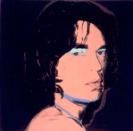 Ain't it funny how things happen
Ain't it funny how things happen Just as we think we've got it all straight
Everything seems to be moving forward
But instead we just sit around and wait
Seems things are in a lockdown
Nervous looks all around
Everyone is speaking in whispers
No one wants to make a sound
I'm losing my touch, yeah
Losing my touch
Losing my touch baby, way too much
Baby, get me out of here
- The Rolling Stones, 'Losing my touch'
So this is how the Devil ends up. No explosions, no fire and brimstone, no pitched battles, however dubious; just a wrinkled old man with too tight pants and a wizened monkey face, jumping around on stage, trying to recreate the vibe of a rebellion that ended 25 years ago, the night that other apostle, that Jesus to outfame all other Jesus's, was shot to death. And still the Devil sings on, surrounded by his gnarled old comrades, the spontaneity of their protest now caged and captured by a jungle of sound equipment, emergency medical kits, security personnel. It's a pathetic sight, one that fills you with sadness for the lost glory of the Revolution and all its ingenuous children.
It is also a lie. Because all you have to do is shut your eyes, and it's still there, they've still got it - the music as fresh, as insidious as it's always been, the same insistent rhythm, the same mesmerising guitar. The joy in the sound is still as addictive, still as corrupting, if by corruption we mean the liberation of the soul from all complexities, a species of clarity that can be experienced but never analysed. This then is the final seduction - the idea that rock might be dying, might need to be rescued, when the truth is that rock will last as long as human beings have blood in their veins and beat in their hearts. Nostalgia is only the last temptation of Rock and Roll. The Devil is still a Street Fightin' Man.
It's been more than 40 years since the Stones' first album came out. 40 years since Out of Our Heads. In the years in between, the Cold War has ended, drugs have become a cliche, sex has turned safe, and the State is too busy playing Cops and Robbers on the international stage to care about student dissent. We live in a world that is both more pragmatic and less innocent than the one the Stones grew up in - they believed in truth, we believe in consequences. And yet, for all that has changed, one thing remains the same. We still can't get no satisfaction.
P.S. For those of you who are wondering where THAT came from, three sources:
a) Reading Nick Hornby's 31 songs (B.: thanks for the tip) and listening to obsessive amounts of music as a consequence.
b) Watching Godard's Sympathy for the Devil
c) A comment to the last post saying I was too young to be quoting Lennon (hah!)
Categories: Arts, Whimsy




5 comments:
Yay The 'Stones. It's hard to find someone in my demographic who likes the Stones. Most of my peers look at me oddly when I mention them. Funnily, that's not the case with the Beatles. I never figured that.
Also yay Nick Hornby and 31 Songs.
Do we believe in consequences? I'm not too sure on that one. I think we are trying to find consequences, just as the previous revolution tried to find truth. Yes, they had to believe in truth to seek it. I don't see the same passion in the search for consequences, though. More akin to monks awaiting enlightenment, today’s revolutionaries try to invoke consequence. The difference being that the monks will know when they obtain their goal as to where this generation is too desensitized...
You've been linked. For the two posts of yours that I've read and the lovely comment on Aishwarya's blog.
Hornby has good taste.
I got a rather baffling "you're too young for Jeff Buckley" comment once.
dibyo: Know what you mean - I've had pretty much the same experience. I remember reading Time magazines round-up of the 20 greatest Artists on the 20th Century (they picked the Beatles) and there was an essay there where the author was arguing that the Rolling Stones deserved it more than the Beatles and I remember being shocked at the idea because neither I nor anyone I knew had ever heard the Stones much. Looking back, it's not a point of view I agree with, but I can see the logic for it.
Oz: Hmmm...perhaps our belief in consequences is more passive, but I still think we see them as being the right metric against which to measure our actions - which is what I meant be believing in them.
anirudh: thanks. I'm honoured.
aishwarya: yes, he does doesn't he? Also, it's depressing how much music he's listened to.
Post a Comment